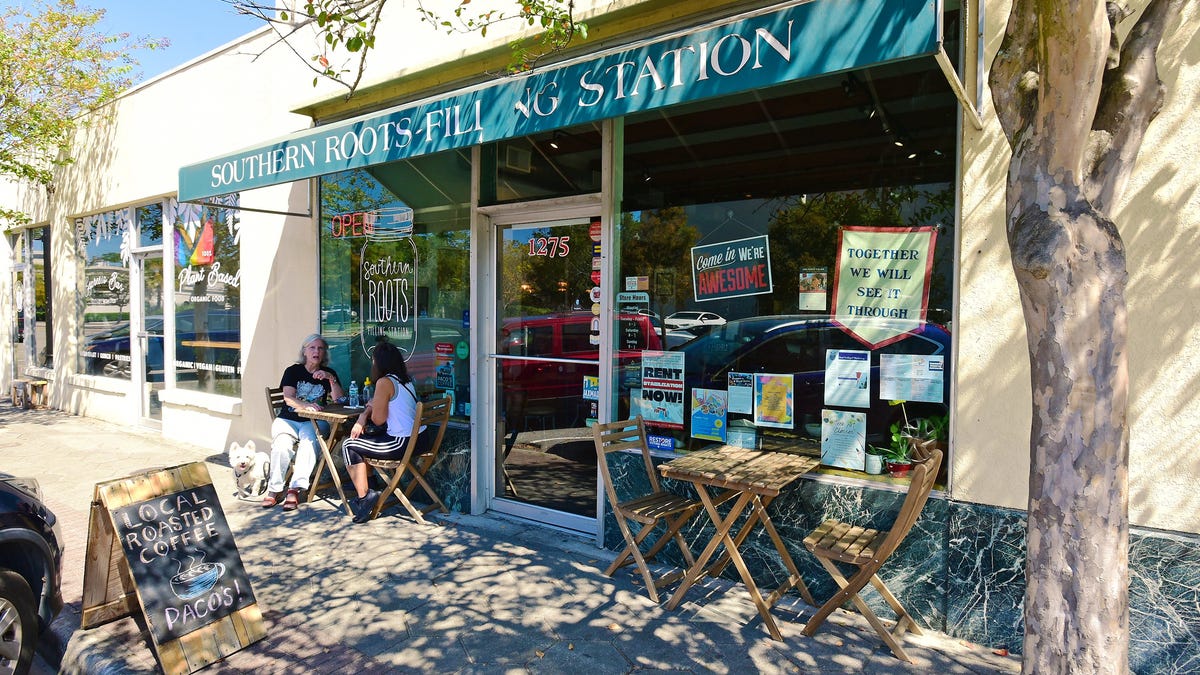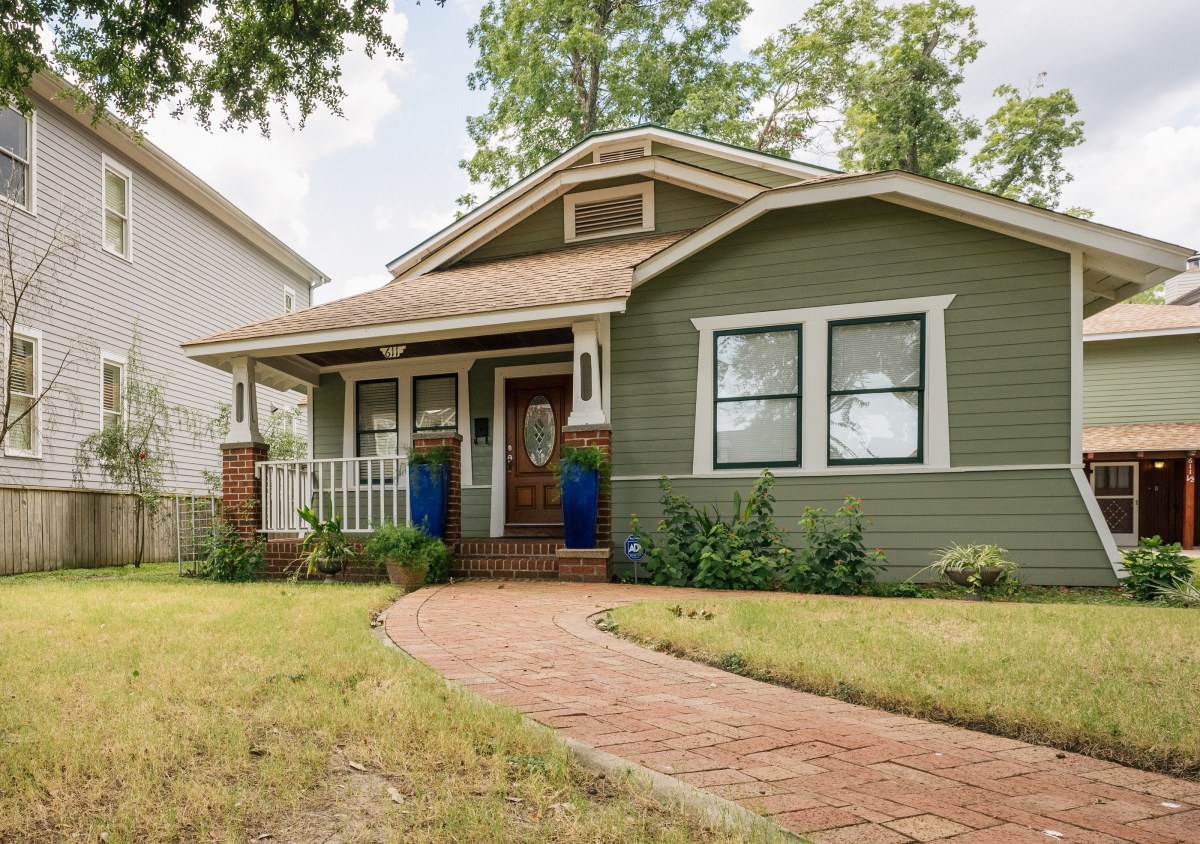Jacksonville businesses face difficult commercial real estate market
Just like residential spaces, commercial real estate values have been increasing over the last few years — making some of Jacksonville’s most beloved small businesses feel the economic pressure.
For restaurants like Southern Roots Filling Station, a potential rent hike led to an increase in community support.
Mariah Goelz, owner of Southern Roots, opened the King Street location with her husband in November 2014. The restaurant started as a pop-up at farmers’ markets in 2011 and “evolved from there.”
The duo worked with the same landlord since then — through the trials of a budding new business and through a buildout in the space next door when they wanted to expand their square footage — until their landlord died and a trust made up of her children took over the building. They were told their lease expired in December 2021, and the trust listed the building for sale, meaning if they were to renew the lease, they would need to negotiate an agreement with the buyers.
But that’s where the trouble came in.
Priciest rent hikes in U.S.: Desperate Florida renters are ‘downsizing or downgrading’ as price increases top the nation
Economic pressures: Jacksonville residents face higher housing costs with rent, utilities both rising
“We [were told we] couldn’t resign the lease if the building was listed for sale,” Goelz said.
From there, she said, there was “a lot of waiting around” and “not a lot of clear communication” until they were given a proposed renewal price four times higher than they had been paying — $35 per square foot, up from $8.50.
“We countered with something we thought we could afford and still be a thriving business [$20 a square foot],” Goelz said. “The $35 number was very surprising for us.”
In the meantime, Southern Roots will continue paying its rent as it had before. Goelz said they were told it would take between 60 and 120 days from the closing date on the building before they would have to vacate the space.
“Other small businesses are reaching out and saying they’re going through the same things and are worried or scared,” Goelz said. “It pains me because not only am I a business owner in this area, I am a resident.”
Community interest grows
The Jacksonville market is “a little bit of a double-edged sword” when it comes to growth, said David Hillegas, managing director for occupier services at Cushman and Wakefield.
“Florida has been insulated from some of the national issues that the rest of the country might be seeing,” he said. “We have seen leasing interest in local investors and owners — but also on a national scale. Investors are looking at Jacksonville as a place they would like to invest their money. It’s internal growth happening, which is a positive thing.”
With this brings tax dollars, employees and “tons of other people who love Jacksonville,” Hillegas said.
“All of those things add to the growth and prosperity of our locals,” he added.
Hillegas said when comparing office space in Jacksonville to that of Miami, Tampa and Orlando — some of the biggest commercial real estate markets in the state — “we are so far below them on a comparative basis of rents.”
“We are [about] 50% lower on those markets,” Hillegas said.
For example, a full-service class A office space in Jacksonville might cost about $25 per square foot while a comparable space in Miami could be $80 per square foot.
The restaurant side is very geographically driven, though, Hillegas said, and there is a lot of competition because visibility and location are so crucial.
“In an ideal world, we would stay where we are,” Goelz said. “We put so much time and energy into building those spaces. They were shells, and we built them.”
The support from the community has been “overwhelming” she said. People have reached out to offer different spaces and options.
“If the perfect spot presented itself, or semi-perfect, we would consider it,” she said. “I think it reminded me that when you invest in a community, both emotionally and financially, they show up for you in a way that is really meaningful. That was really special for me to see.”
While much of the support was positive, there were some Southern Roots fans online who were looking for someone to blame for what was happening to one of their favorite restaurants.
“It was a lot of emotions,” Goelz said. “Some people went way too far and those comments weren’t representative of Southern Roots and our ethos.”
‘Growing pains’ continue
Most of the blame fell to the Urban Division, a three-person team under Colliers International.
Colliers International is a real estate services and investment management company which has 17,000 employees, 2 billion square feet managed, handles $4.5 billion in annual revenue and operates in 63 countries, according to its website.
Matthew Clark, of Urban Division and senior director for Northeast Florida Colliers, said negotiations with Southern Roots became stagnant in July, and August social media posts about the potential closure put everything in the spotlight with little to no context.
Clark said local businesses like Southern Roots are “our bread and butter,” listing places in Five Points like Alewife, Crange Ramen, Hoptinger and Bark on Park, which he said he has worked with in the past.
“Everyone we are talking to is local, regional, not national,” he said. “I think if you look at our portfolio and what we do, everything is pretty much the same. Southern Roots fits in with what we do, which is why this whole debacle is crazy.”
He described everything that transpired as “growing pains in Jacksonville.” Two deals Urban Division did in the Riverside area in the last six months include a dessert shop on Lomax Street, which agreed to a five-year lease at $35 per square foot with 3% annual increases and an Oak Street restaurant with a 10-year lease at $40 per square foot with 3% annual increases.
“There’s a lot of demand because the area is historic and very little vacancy,” Clark said. “You cannot just tear things down and build new.”
Commercial rent in Five Points is being quoted at between $30-45 per square foot, and East San Marco’s vacancy is going for about $30-40 per square foot.
“If you look at the Publix in Riverside, those rents are anywhere from $45 per square foot and up,” Clark said.
A tough market for small businesses
Other small business owners are feeling that crunch, too.
“Small business owners can’t afford these historic district rents at this rate,” said Kathryn Klos, owner of Kathryn’s Wines. “It’s frustrating, and I think it’s scary for all small business owners because you can go into a five-year lease, build something really wonderful, and just have it all pulled out from under you.”
Kathryn’s Wines takes up a small retail space upstairs in Whiteway Corner, but Klos been looking for a new space since a few months after opening in 2020.
But, she’s found affordability to be a tricky area with places she’s looked at ranging from $28 per square foot to $75.
“A lot of these spaces, people have been longtime owners. I get that they need to be making a profit. We’re all in business, and I understand that,” she said. “You have to balance the fact that this is a growing market. What are the average incomes here? What are people willing to pay for goods?”
Klos said she has felt her business “getting squeezed” with the cost of wholesale goods increasing along with rental spaces, though.
“If you’re a corporation, like a Starbucks or a Dunkin’, and you can shift millions of dollars where you need it,” she said. “But when you’re a small business owner, and you have your entire livelihood on the line, and you’re trying to pay your staff, there’s not just $10,000 sitting around for an emergency fund.”
Chris Cohen, owner of Brine Jax, a pop-up seafood restaurant, is also looking for a space for his business.
“We’ve been open about two years and looking for that whole time,” Cohen said. “There’s a lack of spaces available in quality urban-core areas. We’re really looking in Murray Hill because we live there, but we’re open to Riverside, Avondale, San Marco and any place where people go for food.”
However long it takes, Cohen said he wants his business to be in the right spot. His issue with finding that has been less about disproportionately high rent than it has about wanting a small space with a kitchen, which is hard to come by in the areas of interest to him. The search has kept business somewhat stagnant, though.
“It’s not our sign out front,” he said. “People find out about us on social media. The community has been fantastic, but we could grow some more, definitely. You can only do so much [without a space].”
Goelz said the best thing the community can do to show support not just for Southern Roots but for all local businesses facing rent increases or a difficult commercial real estate market is to “continue showing up and supporting all the small businesses in our neighborhoods.”
“Think local first, not just for Southern Roots but for all the small spaces people have invested all of their time and energy in,” she said. “People have been showing up in that way, and while we don’t know what’s happening, that’s one of the best ways to keep supporting us.”



